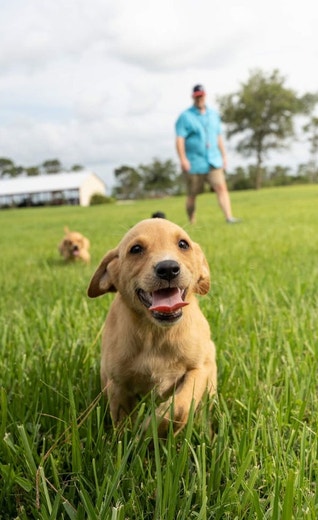
Simple Tips To Bring Out The Most In Your Sporting Dog
FROM THE TEAM EUKANUBA™ BLOG
Al Arthur, Sandhill Retrievers
With so many different training programs, it’s important for owners and handlers to find a method that works for them and their dogs. Here are a few quick tips to add to just about any method, that will help bring out the most in a dog. They’ll also create a strong bond between pup and owner.
BE CONSISTENT
There is no gray area in dog training. Running dogs is as black and white as it gets. When a handler says “come,” the dog will come or it won’t. If the dog comes, then he’s rewarded with a pat, a treat, or a kind word. If the dog doesn’t come, then he needs some correction. Add a check cord, repeat the command, and lead him in. Then praise him. That’s basic stuff. Where it gets complicated is when a handler isn’t consistent. It’s usually when the dog does what it’s asked to do and the handler doesn’t praise him. If the dog isn’t consistently getting praised for a job well done, then what is his motivation for working well? The dog just gives up.
Not using the same command is also a problem. If you say “come” one time and “come on” a second time and “come over here” a third time, you’re using inconsistent commands. Be clear to your dog, and he’ll respond.
HAVE PATIENCE
There is no gray area in dog training. Running dogs is as black and white as it gets. When a handler says “come,” the dog will come or it won’t. If the dog comes, then he’s rewarded with a pat, a treat, or a kind word. If the dog doesn’t come, then he needs some correction. Add a check cord, repeat the command, and lead him in. Then praise him. That’s basic stuff. Where it gets complicated is when a handler isn’t consistent. It’s usually when the dog does what it’s asked to do and the handler doesn’t praise him. If the dog isn’t consistently getting praised for a job well done, then what is his motivation for working well? The dog just gives up.
Not using the same command is also a problem. If you say “come” one time and “come on” a second time and “come over here” a third time, you’re using inconsistent commands. Be clear to your dog, and he’ll respond.
It takes a lot of patience to work with dogs. Some dogs will really test a handler. Handlers can’t lose their temper in those situations. Getting frustrated doesn’t do anyone any good. But it can do a lot of damage to the relationship between the dog and the handler. Dogs pick up on a handler’s attitude, and training sessions need to be positive and upbeat. When dogs are having fun, they will do just about anything asked of them.
SET STANDARDS
Training shouldn’t be random. There should be a standard. Handlers are teachers, and as teachers they need to demonstrate what they want the dog to do. Expecting a pup to do a blind retrieve without learning the basics isn’t going to happen. Running blinds is a series of steps. Start with yard work, and when the pup hits that standard move on to retrieves. When they’re successful at the retrieves, move on to marks. After they’ve got the marks down, move on to running blinds. The standard is in place, there is a progressive training program lined up, and that’s the best way to move a dog along. Always put dogs in a position for success, and they’ll develop confidence and boldness. Be sure to reward them along the way, and you’ll have a performance athlete that exceeds your expectations.
Dog training should be fun for the owner and the dog alike. If it’s not fun, then something needs to change. Look at your consistency, patience, and standards and modify if necessary. It won’t take long before you’re both right on track.




